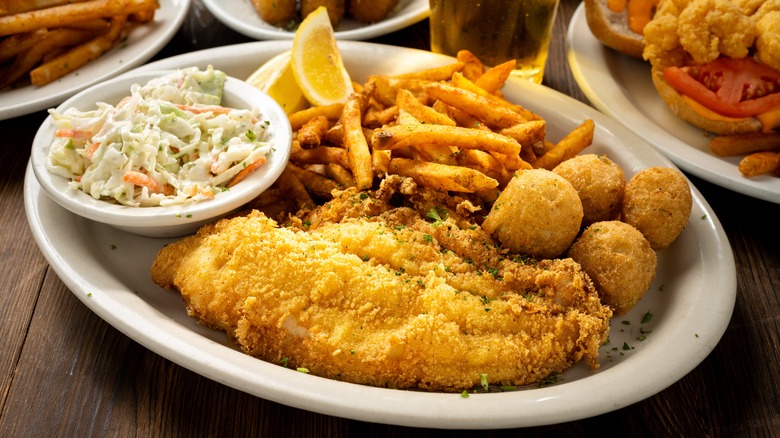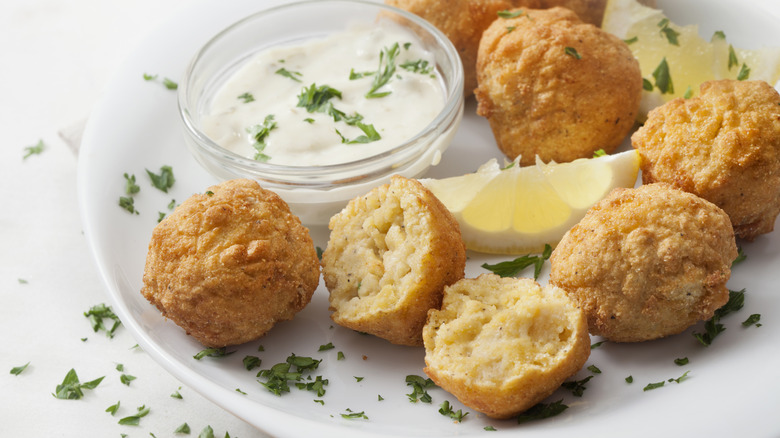Hushpuppies Used To Have A Very Different Name
Most southern food enthusiasts couldn't imagine enjoying a traditional southern meal without a side of hushpuppies. Hushpuppies are rounds of deep-fried cornmeal batter, crisp on the outside, warm and soft on the inside with a rich, toasty corn flavor. They've been served alongside seafood pretty much since their inception, but in the beginning, they were called red horse bread.
While there are several theories about the origin of hushpuppies, including that they were created by Civil War soldiers, by fishermen to quiet their hungry dogs, or by Native Americans, the most reputable story involves Romeo "Romy" Govan. While hushpuppies in the form that we know them may have already existed, he is generally credited for popularizing the dish, which he served at his famous fish fries (or fish frys, if you prefer). The "red horse bread" name had nothing to do with the food's color or horses, but likely had everything to do with one of the types of fish he regularly served: river redhorse. Our knowledge of how the name transitioned to hushpuppy is murky at best, but this is what most people call the southern treat today, even though several other names existed for it in different parts of the South, including "red devils" and "three finger bread" in Georgia and "wampus" in Florida.
How red horse bread came about
Born into slavery in 1840, Romeo Govan eventually made his living (and built his legacy) by hosting fish fries near his home along the Edisto River in South Carolina. After Emancipation, he and his wife Sylvia rented a plot of land which they farmed. The area was a hot spot for fishermen, and Govan saw an opportunity to go into business, so he built a riverside structure that he called a "clubhouse" and hosted fish fries using the plentiful fish nearby. It was here that he created his fried rounds of thick cornmeal batter, christened red horse bread, to accompany the fish dishes.
His fries became so popular that the highest of South Carolina society, like governors and senators, would regularly patronize the clubhouse. Eventually, the Govans made enough money to purchase the land outright, and they lived there for the rest of their lives. By the time Romeo died in 1915, red horse bread had become a big part of South Carolina cooking. And it still is (though the name has changed), even being served at some of Southern fast food chains.
Based on written documents from as early as 1927, the side dish was being called "hushpuppies" in places like Florida and Georgia, so clearly the dish had spread, was being served with seafood, and was going by a new name.
'Hushpuppy' was originally a word for scandal (or gravy)
It's easy to figure out why red horse bread spread across the South; it was absolutely delicious and easy to make, so naturally, those who had tasted it could easily pass along the details of it wherever they went. But how it transitioned from horse to hound isn't as clear. The term "hushpuppy" certainly existed at the time when Govan was delighting customers with these cornmeal fritters, but it had nothing to do with food.
The term was used in a London magazine article from 1738 to describe quieting someone or covering up corruption. It was used again in a similar context in the 20th century when describing a scandal that happened under President Harding in the United States, per Robert F. Moss, a South Carolina native, food historian, and author.
The term was also used to describe both gravy and broth long before it was applied to fried cornmeal. An 1879 article from the San Antonio Herald and an account of the 1899 Spanish-American War both describe "hush-puppy" as a type of gravy, and in 1915, Mississippi Senator H.H. Casteel said that he called pot-liquor (or potlikker: the broth that is made when you cook collard greens) "hush-puppy" because it kept the "'houn' dawgs' from growling" (in reference to his stomach).
Today, the word "hushpuppy" refers to the beloved Southern food and not much else, but let's not forget that we couldn't have had the puppy without a pony first.


